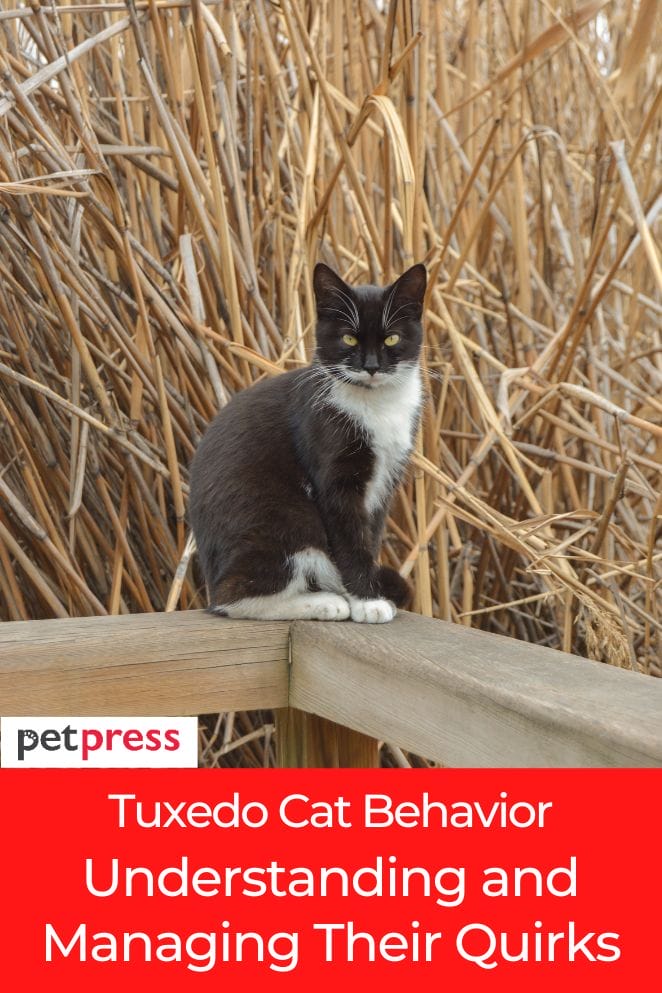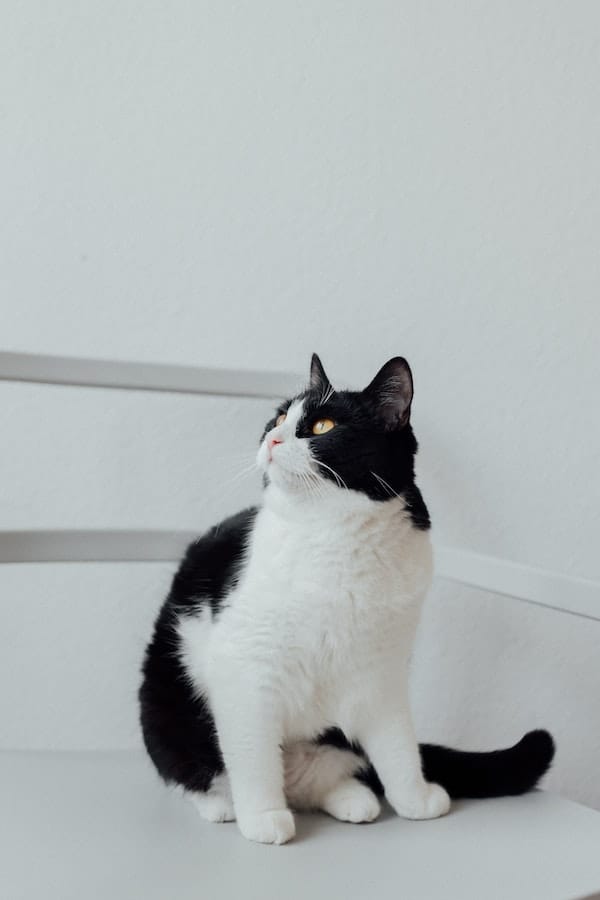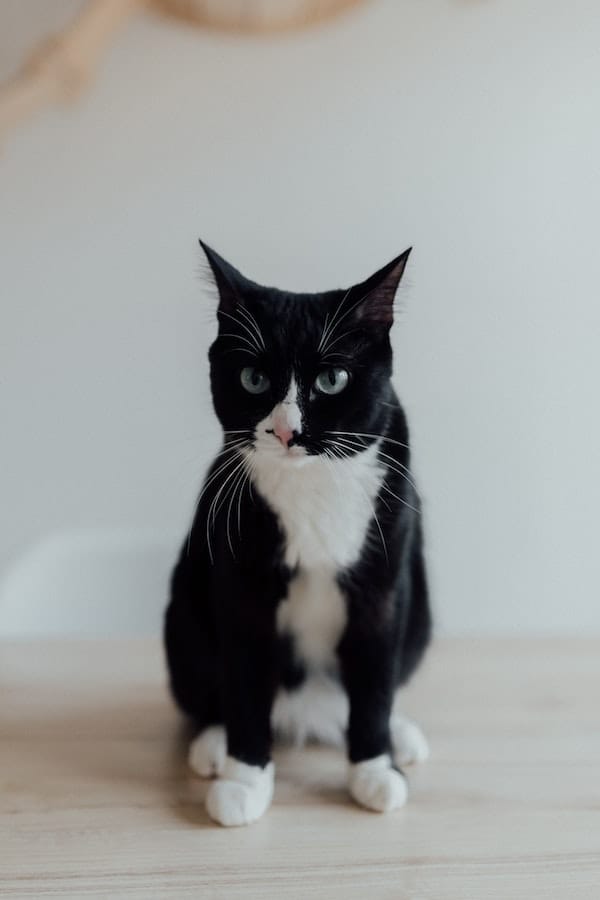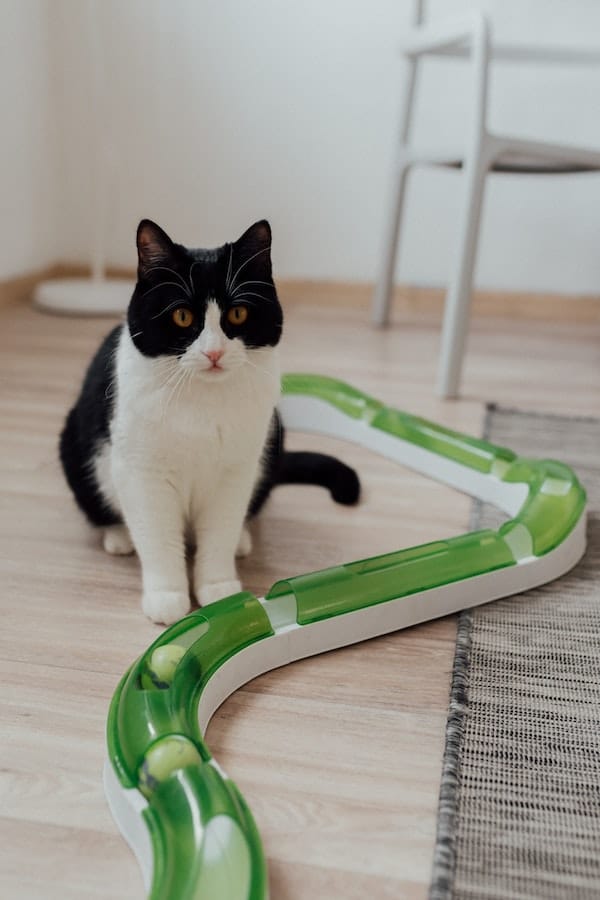
Hey there, cat lovers! If you’re a proud parent of a tuxedo cat, you probably already know that they’re a special breed with unique personalities and behaviors.
These enchanting feline friends sport a formal black and white attire that makes them look like they’re dressed for a fancy soirée.
But beneath their dashing appearance lies a world of interesting quirks and behaviors that we’ll explore in this blog post.
Tuxedo Cat Personalities and Behaviors
Tuxedo cats are like the James Bonds of the feline world – they exude charm, mystery, and a dash of playfulness.
Here’s a glimpse into their captivating personalities and behaviors:
Affectionate and social
Tuxedo cats have a unique knack for being affectionate and social.
They seem to have an uncanny ability to sense when you need a furry friend by your side.
These cats are often drawn to their human companions, snuggling up for warmth and companionship.
If you’re a fan of cuddling, having a tuxedo cat is like having a live-in cuddle buddy.
Playful pranksters
If you’re in need of amusement, look no further than a tuxedo cat.
They possess an innate playfulness that can rival a circus clown.
Interactive toys, feathered wands, or even just a crumpled paper ball – they’ll pounce, chase, and perform acrobatic feats that can keep you entertained for hours.
These playful pranksters have a knack for surprising you with their clever antics. Be prepared for laughter and amazement.
Intelligent and Curious
Tuxedo cats are no slouch in the intelligence department.
They approach life with a sense of curiosity that’s truly commendable.
Your home becomes their playground, and they will explore every nook and cranny, often finding themselves in the most amusing and sometimes precarious situations.
Their inquisitive nature can lead to moments of hilarity and wonder as they interact with their environment.
Vocal communicators
Tuxedo cats aren’t the silent, mysterious types you might associate with James Bond.
Quite the opposite, they are vocal communicators.
Meowing, purring, and chirping are their preferred modes of expressing themselves.
It’s as if they’re having a conversation with you, sharing their thoughts and feelings.
Be ready for a delightful back-and-forth with your feline friend.
Talkative
Among their many vocalizations, tuxedo cats are known for being particularly talkative.
They have a wide range of meows, chirps, and purrs that they use to engage with their owners.
This chattiness can be endearing as you learn to decipher their moods and desires through their unique language.
It’s almost like having a chatty friend who always has something to say.

Common Tuxedo Cat Behavior Problems
Despite their charming personalities, tuxedo cats can sometimes present their own set of challenges.
Here are a few common behavior problems you might encounter:
Scratching furniture
Tuxedo cats, just like their fellow felines, have a natural instinct to sharpen their claws.
Unfortunately, your furniture might become an unintended victim.
To prevent this, it’s essential to provide them with an alternative.
A sturdy scratching post or pad can be a lifesaver, as it gives your tuxedo cat a designated place to scratch.
You can also use cat-friendly deterrent sprays on your furniture to steer them away.
Litter box preferences
Some tuxedo cats can be quite particular about their litter box.
They might have specific preferences when it comes to the type of litter, the cleanliness of the box, or its location.
If your cat is showing signs of disapproval, experiment with different litters and try various box placements.
Keep the litter box clean and scoop it daily to ensure your feline friend’s comfort.
Food fussiness
Tuxedo cats can sometimes be discerning eaters.
They might turn their noses up at their food if it doesn’t meet their high standards.
It’s a good idea to be patient and willing to try different brands and flavors.
High-quality cat food can be a good place to start, but individual preferences can vary greatly.
Keep in mind that abrupt food changes can lead to digestive upset, so make any transitions gradually.
Aggression or dominance
Some tuxedo cats may display aggressive or dominant behavior, which can be challenging to deal with.
This could manifest in hissing, growling, or even aggression towards other pets in your home.
In such cases, it’s important to consult with a professional animal behaviorist or your veterinarian for guidance.
They can help you understand the root causes and work on behavior modification strategies to ensure a harmonious living environment.
Excessive vocalization
Tuxedo cats are known for being talkative, but excessive vocalization can sometimes become a problem, especially if it’s due to stress, anxiety, or a medical issue.
If your cat’s vocalization becomes excessive or out of the ordinary, consult your vet to rule out any underlying health concerns.
In cases of stress or anxiety, creating a calm and secure environment and providing interactive toys can help alleviate this behavior.

Tips to Manage Tuxedo Cat Behavior Problems
Now, let’s get to the good part – how to manage these behavior issues effectively. Here are some tips to keep your tuxedo cat on their best behavior:
Positive reinforcement
When your tuxedo cat exhibits desired behavior, be sure to reward them with positive reinforcement. Treats, praise, and affection are excellent motivators.
For instance, if your cat uses the scratching post instead of your furniture, offer a tasty treat or an affectionate petting session.
This positive feedback helps them understand what behaviors you appreciate.
Provide mental stimulation
Tuxedo cats are known for their intelligence and curiosity.
To keep their minds engaged and prevent boredom, offer them a variety of puzzle toys, interactive feeders, and engaging play sessions.
These mental challenges can help curb undesirable behaviors by redirecting their focus.
Regular vet check-ups
It’s crucial to ensure your tuxedo cat is in good health.
Sometimes, behavior problems may have an underlying medical cause.
Regular vet check-ups can help you identify and address any health issues that might be contributing to problematic behaviors.
Pain or discomfort, for example, can lead to aggression or changes in litter box habits.
Consult with a professional
If behavior problems persist despite your efforts, don’t hesitate to seek guidance from a professional animal behaviorist or a veterinarian who specializes in feline behavior.
They can provide expert insights, create a tailored behavior modification plan, and offer valuable advice to address your specific challenges.
Environmental enrichment
Enhance your cat’s living space with environmental enrichment.
This can include providing climbing structures, cozy hiding spots, and windows with bird feeders to stimulate their natural instincts.
A stimulating environment can help alleviate stress and reduce the likelihood of unwanted behaviors.

Consistency
Cats thrive on routines and consistency.
Maintain a regular feeding schedule, litter box cleaning routine, and playtime to create a predictable and secure environment.
This can help reduce anxiety and prevent behavioral issues.
Patience
Managing behavior issues may require time and patience.
Be consistent in your training and remember that it can take some time for your cat to adjust to new behaviors.
Avoid punitive measures, as they can lead to stress and fear.
Conclusion
In the world of feline companions, tuxedo cats stand out as charming, intelligent, and often mischievous characters.
Their behaviors can be both endearing and challenging, but with the right understanding and techniques, you can foster a harmonious relationship with your tuxedo cat.
Remember, tuxedo cats are like tiny, furry puzzles.
Understanding their unique personalities and addressing any behavior problems with patience and love will lead to a rewarding bond that will last a lifetime.
FAQs
No, tuxedo cats aren’t a distinct breed. They can be of various breeds, but what they share is their distinctive black and white coat pattern, resembling a tuxedo.
To prevent furniture scratching, provide a suitable scratching post and train your cat to use it. You can also use cat deterrent sprays on the furniture to discourage them.
Cats meow for various reasons – they might be seeking attention, expressing hunger, or just chatting with you. If the sudden increase in vocalization is concerning, consult a vet to rule out any underlying health issues.


GIPHY App Key not set. Please check settings